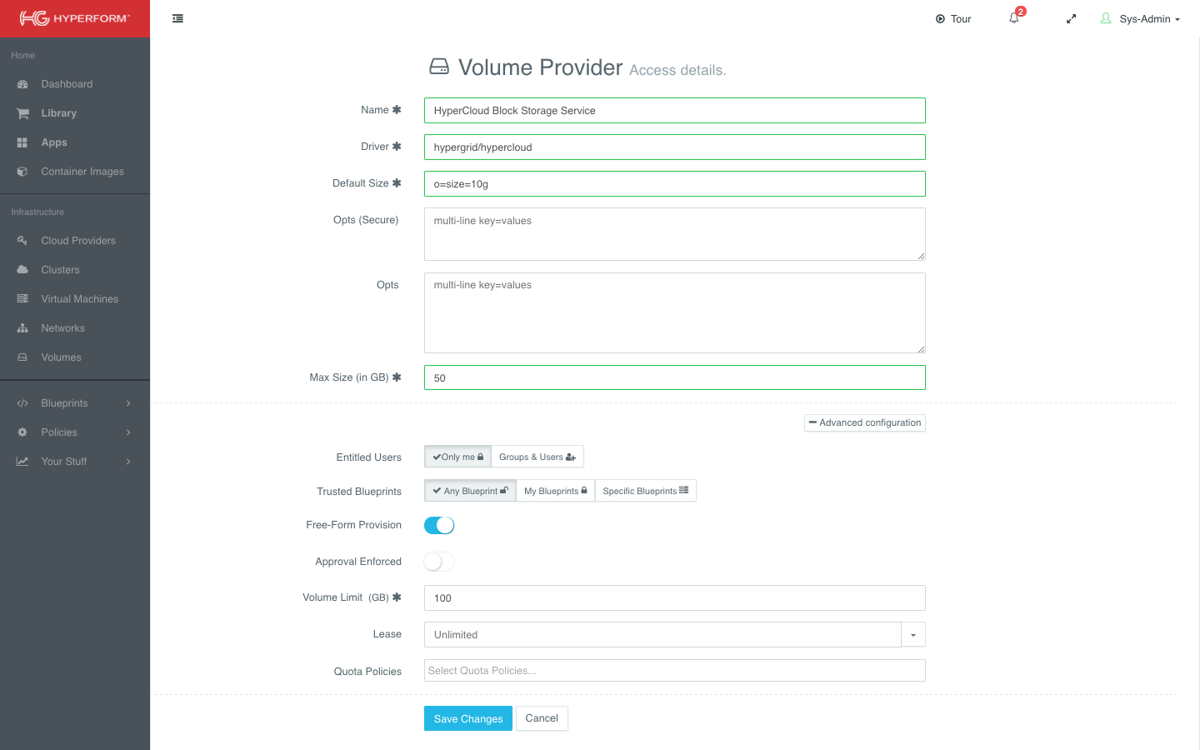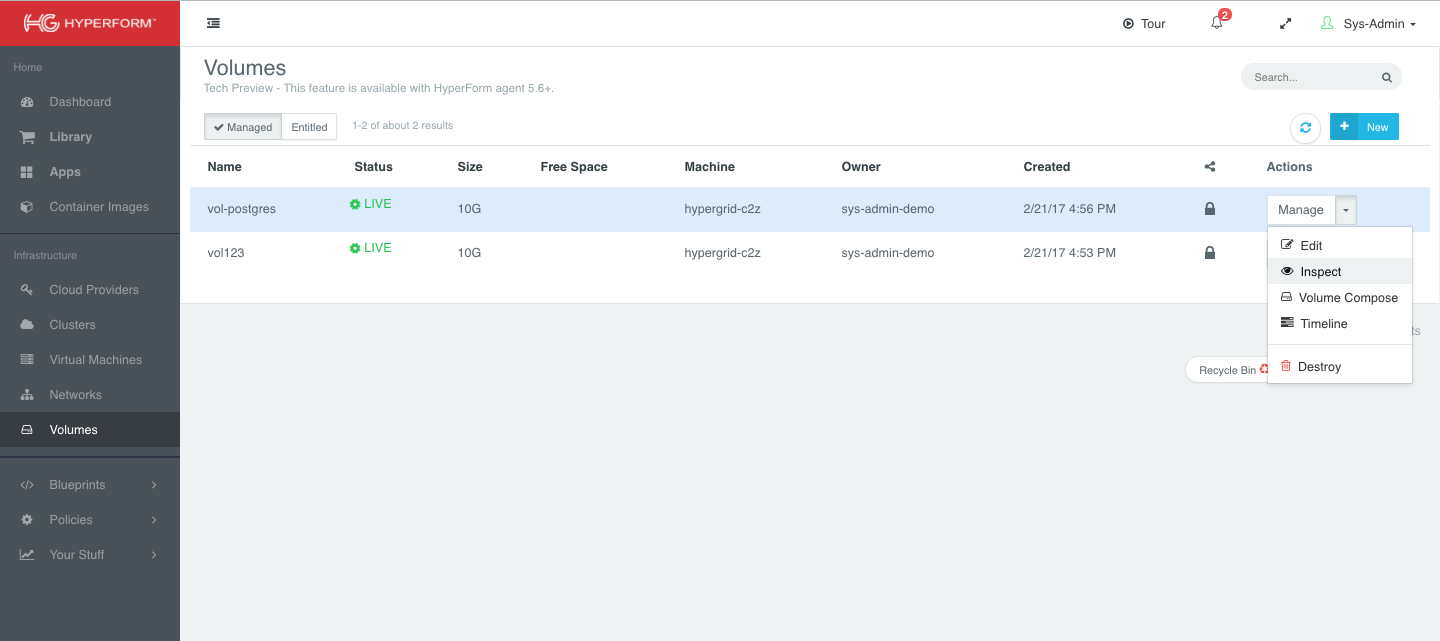Docker Certified Plug-in for HyperCloud Block Storage Service by HyperGrid
Automated storage service for containerized applications
This is a Press Release edited by StorageNewsletter.com on March 6, 2017 at 2:34 pmHyperGrid, Inc. announced that its Block Storage Volume plug-in has been Docker certified and is available in the Docker Store.
HyperCloud
Click to enlarge

This plug-in enables an automated storage service for containerized applications. The Docker Certification Program is a framework for partners to integrate and certify their technology to the Docker Enterprise Edition commercial platform. With HyperCloud, deploying stateful applications on containers can be done in a single click while adhering to IT-defined entitlements, approvals, quotas, and QoS policies.
The complexity of a piece-part approach and the absence of a utility consumption model in most private cloud initiatives has prevented many organizations from delivering mission-critical applications to their customers quickly. Many IT organizations find themselves stuck with manual processes that result in long waits experienced by end users, rising operational expenses, inconsistent infrastructure, and overall dissatisfaction by business users.
HyperCloud Block Storage Service meets the diverse needs of enterprises by providing reliable block storage to run mission-critical applications such as Oracle, SAP, Exchange and SharePoint. Leveraging storage volumes that provide consistent and low-latency performance, HyperCloud delivers database as a service for SQL Server, MySQL, MariaDB, PostgreSQL, Mongo, and many others. The database services in HyperCloud deliver scalable and highly available databases supporting multi-host clustering, backup, replication, and automatic database recovery.
Click to enlarge
Advanced infrastructure and application modelling for both virtualized and container-based application workloads allow customers to provision databases using:
-
IT-blessed scripts (e.g. BASH, PowerShell, Puppet, etc.) that can be invoked at twenty different life-cycle events (triggers) to standardize application deployment on any infrastructure
-
Data injection to support dynamic application dependencies in multi-VM or multi-container deployments
-
Self-provisioning via a self-service library of infrastructure, storage, network, database, and application services means IT services are delivered in minutes, not days, reducing the likelihood of shadow IT. The governance framework in HyperCloud provides role-based access controls, entitlements, approval, quota and cost metering policies to enable secure and holistic management of resources, workloads, and operations across any cloud with the cost visibility needed to control spending.
Click to enlarge
Key benefits of Docker Volume plug-in for HyperCloud Block Storage:
-
Performance and fault tolerance. Performance storage that provides fault tolerance to deliver HA with fast performance across the data network.
-
Policy-based governance. Leverage HyperCloud’s governance framework to enable role-based access controls, entitlements, approval, quota and cost metering policies to manage block storage usage across the enterprise with the cost visibility needed to control spending.
-
Rapid block storage delivery. Self-provisioning of block storage for system administrators means VMs and containers with dedicated, persistent storage volumes are delivered in minutes under the governance policies and security controls defined by IT.
-
QoS controls. For the mission critical applications, QoS controls on HyperCloud’s all-flash storage can be configured to prioritize I/O and provide the expected service levels.
-
All-flash advantage. Reducing costs by making maximum use of available storage space with all-flash’s smaller footprint.
-
Inline erasure encoding. Protecting the data before it leaves the host and eliminating the need for replicas.
-
Linear scaling and pricing. Adding capacity as needed with pay-as-you-go pricing.
-
Infrastructure and storage as Code. HyperCloud allows users to create ‘Machine and Volume Blueprints’ as code controlled by entitlements to restrict access to the blueprints. Customers can define tiers for their infrastructure and storage services – e.g. platinum, gold, and silver. Each tier would be allocated specific compute, network and storage resources given the workload and the environment on which it would be provisioned.
“We would like to congratulate HyperGrid on their acceptance of the HyperCloud Block Storage Volume plug-in into the Docker Certified Program. Enterprise IT teams are looking to Docker to provide recommendations and assurances on the ecosystem of container content, infrastructure and extensions. HyperGrid’s inclusion into the program indicates that their plug-in has been tested and verified by Docker, confirming for customers that their container images have been evaluated for security and are supported and built according to best practices,” said Marianna Tessel, EVP, strategic development.
“We’re excited to roll out HyperCloud Block Storage Service along with the certified volume plug-in in the Docker Store. While Docker was initially popular among developers working on stateless application architectures built on microservices, enterprises are increasingly leveraging Docker to run stateful applications – for which database storage management is the primary challenge. HyperCloud delivers container databases that can be easily deployed and managed with an advanced orchestration framework that lets users easily set up replication, backup and automatic scale out, which are all needed in a production environment,” said Intesar Mohammed, VP, engineering, HyperCloud, HyperGrid.
“With the new block storage service that enables automated provisioning and mounting of high performance block devices on VMs and containers, enterprises can run mission-critical applications such as Oracle, SAP, Exchange and SharePoint that are backed by high performance and fault tolerant storage volumes,” said Manoj Nair, chief product officer, HyperGrid.















 Subscribe to our free daily newsletter
Subscribe to our free daily newsletter

